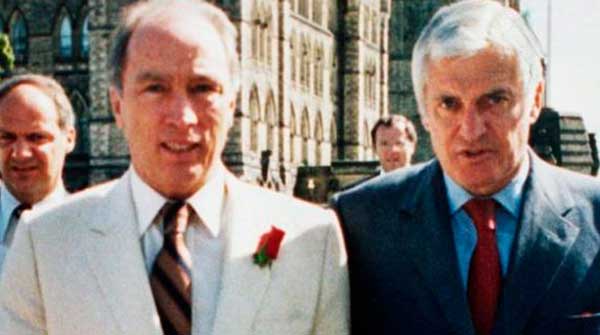After the Trudeau-Chretien wing of the party turned on him, an offer of help came from an unlikely source – Brian Mulroney
 My previous column was prompted by Steve Paikin’s new book – John Turner: An Intimate Biography of Canada’s 17th Prime Minister. But there’s more to Turner than I was able to address in a single column. So, drawing again from Paikin’s book, another is in order.
My previous column was prompted by Steve Paikin’s new book – John Turner: An Intimate Biography of Canada’s 17th Prime Minister. But there’s more to Turner than I was able to address in a single column. So, drawing again from Paikin’s book, another is in order.
Parliamentarian
Understanding Turner implies understanding his view of Parliament. He thought it should be quite different from the way it has evolved in recent decades.
Turner saw Parliament as more than a repository of votes to support whatever the prime minister’s office demanded. It should also be a national forum for free debate and individual members should have a significant voice in what transpired. They shouldn’t just be part of a legislative machine with the prime minister’s office controlling the levers.
And Turner had plenty of personal experience in making Parliament work. As justice minister, he shepherded the most “far-reaching and controversial legal reforms since Confederation” through the House. This was Bill C-150, which introduced major changes with respect to the legal treatment of abortion, divorce and homosexuality. Passed in May 1969, it was considered very advanced for its day.
Although those reforms are generally associated with Pierre Trudeau, Liberal eminence Jerry Grafstein gives Turner much of the credit. To quote: “If you look at the Just Society, the guy that put through the Just Society was John Turner. Trudeau couldn’t get it through Parliament. John Turner was great in Parliament.”
Getting along with the Americans
Turner’s biggest moment as Liberal leader was his all-out fight against the North American Free Trade Agreement. While he lost that one, it was one of the few leadership occasions where he was the political powerhouse Liberals had been anticipating.
It would, however, be a mistake to infer anti-Americanism from this. Unlike some of his Liberal colleagues, instinctive antipathy to the United States wasn’t part of his makeup. Turner, in fact, got along with all sorts of Americans – even Republicans!
True, he was closer to Democrats and very much in thrall of the Kennedy legend. Indeed, he wasn’t above exaggerating his personal Kennedy connections.
But, as finance minister, Turner also developed an excellent personal relationship with Richard Nixon’s treasury secretary, George Shultz. In the interest of promoting healthy and amicable relations with the Americans, he would regularly go to Washington to play tennis and have dinner with Shultz, thereby beginning a friendship that lasted the rest of his life.
In Turner’s later telling, he undertook this at Trudeau’s behest. Because Trudeau and Nixon didn’t get along, something needed to be done. So the “Scotch and tennis” initiative was duly launched and achieved its purpose: “We had a five-point agenda and we solved every point.”
Interestingly, too, Turner’s take on Nixon was more generous than what you’d expect from a Liberal. Rather than denigrating the president, Turner later remarked how Nixon “impressed me enormously with his intellect.”
The kindness of Brian Mulroney
When Turner left politics for the second and final time, he must have been disappointed – even shocked – at the reception awaiting him. Unlike the mid-1970s, Bay Street firms didn’t fall over themselves to recruit him. He was no longer the golden boy, the prize catch, the prime minister in waiting.
Paikin ascribes much of the negativity to the battle over the Free Trade Agreement. One quoted observer puts it this way: “He betrayed his earlier friendships by opposing free trade. Everyone cut him off after that. He got no decent boards. He knew it. And his friends knew that’s what had happened to him.”
For a proud man who’d taken “something in the order of an 80 percent pay cut” to return to politics in 1984, this would’ve stung. Add “his hurt at what he saw as the shocking disloyalty he experienced from the Trudeau-Chretien wing of the party” and you have a situation that Paikin doubts Turner ever fully recovered from.
An offer of help came from an unlikely source – Brian Mulroney.
Mulroney and Turner may have fought each other in two brutal election campaigns, but mutual respect still prevailed. And on becoming aware of the difficulty Turner was experiencing in his job search, Mulroney made an offer. Turner could become ambassador to Italy. It would be a comfortable appointment where there’d be ample time to write his memoirs.
When Turner graciously turned it down, Mulroney sweetened the offer by adding the Vatican to the proposed posting. Turner again declined, preferring to take his chances in Toronto.
Still, it was a generous gesture. Sometimes your ostensible enemies are kinder than your nominal allies.
Pat Murphy casts a history buff’s eye at the goings-on in our world. Never cynical – well, perhaps a little bit.
For interview requests, click here.
The opinions expressed by our columnists and contributors are theirs alone and do not inherently or expressly reflect the views of our publication.
© Troy Media
Troy Media is an editorial content provider to media outlets and its own hosted community news outlets across Canada.


